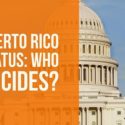The status question is the most important question for Puerto Rico. So who decides Puerto Rico’s status?
Puerto Rico has been an unincorporated territory belonging to the United States since 1900, when the U.S. federal government defined the position of Puerto Rico. The Island became a possession of the United States when Spain handed it over to the U.S. in 1898.
Didn’t the Puerto Rico constitution change that?
In 1950, Congress passed a bill that allowed Puerto Rico to write a constitution, which Congress would approve. “The bill merely authorizes the people of Puerto Rico to adopt their own constitution and to organize a local government,” Secretary of the Interior Oscar Chapman clarified. “The bill under consideration would not change Puerto Rico’s political, social, and economic relationship to the United States.” In other words, Puerto Rico continued to be what it still is today: a territory of the United States.
The three status options which became the foundation of Puerto Rico’s three political parties were these:
- statehood, which would give Puerto Rico an equal position with the 50 states
- independence, under which Puerto Rico would be an independent sovereign nation, with or without a Free Associated State agreement with the U.S.
- “commonwealth,” which some Puerto Rico leaders claimed would be a special arrangement of some kind
The U.S. government has never agreed to the concept of an “enhanced commonwealth” or any special arrangement. The Puerto Rico Constitution did not change the political status of the Island, as Chapman said in 1950 and all branches of the U.S. government have said ever since.
So the “commonwealth” option really is a choice to remain an unincorporated territory of the United States. All territories of the U.S. are under the plenary — that is, complete — control of the U.S. Congress. It says so in the U.S. Constitution, in the section known as the Territorial Clause.
Congress actually decides Puerto Rico’s status.
So far, Congress has chosen to keep Puerto Rico as a territory. They could make Puerto Rico an independent nation, but independence is not popular in Puerto Rico. In each referendum, independence received less than 6% of the votes. Puerto Rico has never elected a member of the Independence Party as governor. It is hard to see any reason for the U.S. Congress to force independence on Puerto Rico, home of 3.5 million U.S. citizens.
Congress could also make Puerto Rico a state. Members of Congress, as well as President-Elect Donald Trump, have generally said that they will respect the will of the people of Puerto Rico. Now that Puerto Rico’s voters have chosen statehood twice, the federal government should take action to make Puerto Rico a state.
Congress has therefore agreed to allow the residents of Puerto Rico to decide their status. But this will only be true if Congress takes action on the decision of the people. If Congress refuses to take action, then Puerto Rico will continue to be a territory. This is why it is so essential to reach out to Congress.
The members of Congress are busy people. If they think their constituents don’t care about Puerto Rico, then they also will not care about Puerto Rico. They need to be educated about Puerto Rico’s status, and they need to understand that Puerto Rico should not continue to be a territory.








5 Responses
Puerto Rico needs its independence with its own autonomy and self economic development,Its needs its own soverignity and right to exist as a nation with its own identity and culture.
Delusional fantasy as is best my friend , good dream , time to wake up to reality , CUBA , VENEZUELA , NICARAGUA , CENTRAL AMERICA DIRT POOR ECONOMIES , SOCIALIST COMUNIST AGENDA . STATE 51 IS THE ONLY INTELLIGENT COMMON SENSE WAY .
That’s it no more states enough!!!Don’t get me wrong United States is a great country born here and I love it very much but in history is better with 50 states no more than that.
Those that seek statehood have no clear understanding about freedom and have been brainwashed by the socialist statehood propaganda.
The CONCLUSION of this report IS WRONG! You see that conclusion is based on the COLONIALIST mentality most Puerto Ricans have today. These people FORGET that we are AMERICAN CITIZENS, and even though, Congres will have the LAST word, a SIMPLE “YES”, THE AMERICAN CITIZENS living on the ISLAND ARE the ones to DECIDE the political STATUS of the island. I mean IF THEY are allowed to VOTE by well DEFINED the three CONSTITUTIONAL alternatives available to the island, Independence, Statehood and Free Association (Associated Republic). I said if the locals are allowed to vote because the political electorate gas been divided 48% – 48% – 4% between the PPD, PNP and Independence parties since 1968, and the ONLY thing holding back that VOTE is the PPD which is AFRAID to DEFINE their NON-Territorial and CONSTITUTIONAL STATUS (whichever way they want to call it. Additionally NON of the political parties, in all honesty, since 1972 HAVE NOT BEEN interested in changing the status. They have enjoyed too much administering the COLONIA-Territory and all their leaders, friends and families getting rich depending on Government jobs and contracts.